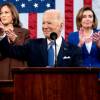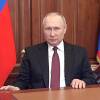During his first State of the Union address since taking office, President Joe Biden emphasized his support of Ukraine and celebrated the “pure courage” of the Ukrainian people — while continuing to rule out sending U.S. troops to the country to assist in its fight against Russia.
On Monday, Ukraine’s President Volodymyr Zelensky urged the Biden administration and NATO to impose a “no-fly zone” over “significant parts” of Ukraine in an effort to guard the country’s airspace. And while President Biden announced new sanctions closing off U.S. airspace to all Russian flights during his State of the Union address, the Biden administration views implementation of a no-fly zone over Ukraine as a significant escalation.
“[President Biden] has broad support in the 60s and 70s [percentage] for two things: the sanctions and isolation in Russia, and for not utilizing military force,” national security analyst Juliette Kayyem told Boston Public Radio on Tuesday. “So that's why the White House is pushing back on this notion of a no-fly zone."
More National News
“In some weird way, I think [President Biden has] sort of found the sweet spot, and he's communicating it very well,” she continued. “And so I think that's really key because he needs to do that right. He needs to not lose support.”
Many Americans are concerned over the effects of an economic sanction levied against gas exporter giant Gazprom and oil company Rosneft, which both “fund a large chunk of the Russian state and are among the country’s largest employers,” according to The Wall Street Journal. The average cost of a gallon of gasoline in Mass. has soared 8 cents over the last week , with drivers in the state spending an average of $3.62 per gallon.
In an attempt to allay concerns over rising gas and oil prices, President Biden announced that the U.S. “has worked with 30 other countries to release 60 million barrels of oil from reserves around the world,” with America “releasing 30 million barrels from our own Strategic Petroleum Reserve.” Even with this announcement, however, Kayyem believes that the effects of the sanctions against Russia will still be felt in the U.S.
“Yesterday, [President Biden] talked about offsetting some of the potential damages [of sanctions],” Kayyem said. “I'm sure we're hoping that this doesn't happen in terms of energy and stuff, but we will feel it.”
“I'm surprised we haven't seen any of the downstream concerns I was worried about, like cyber attacks — yet," she added. "But you are seeing brutal military behavior in Ukraine, which I think we only have a glimpse of.”
Kayyem is former assistant secretary for homeland security under President Barack Obama, and the faculty chair of the homeland-security program at Harvard’s Kennedy School of Government. Her forthcoming book is: “The Devil Never Sleeps: Learning to Live in an Age of Disasters.”









